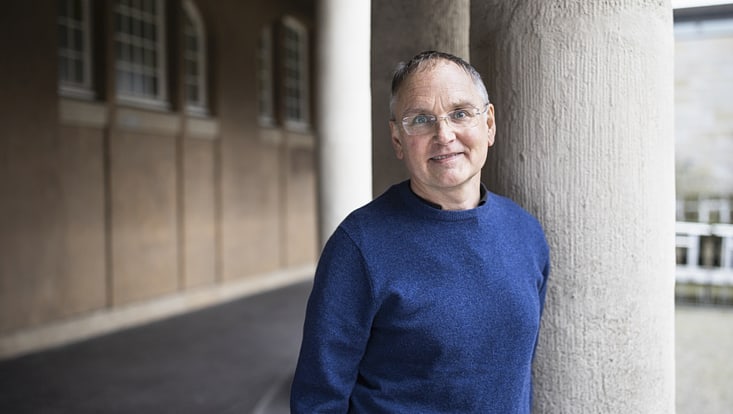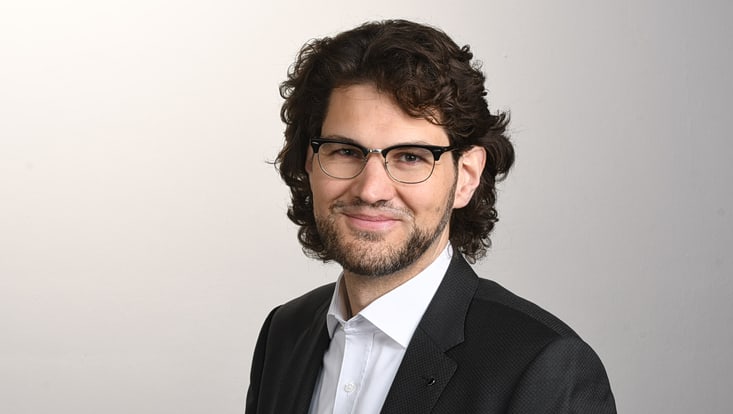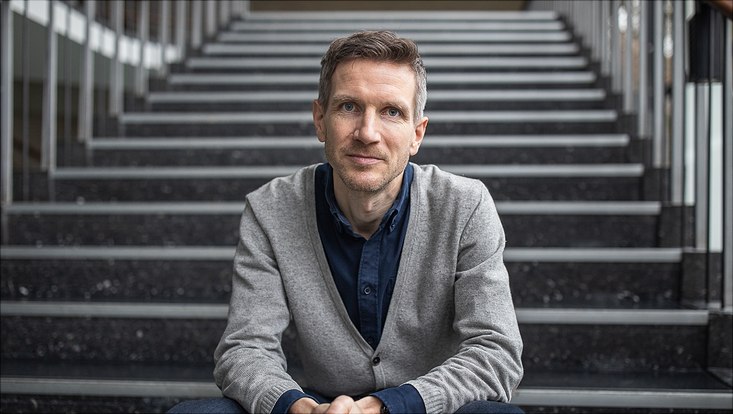Welcome aboard!How Music Moves UsProf. Dr. Daniel Müllensiefen strengthens the Humanities.
1 April 2025, by Müllensiefen/Red.

Photo: University of Hamburg / Esfandiari
Every year, the University of Hamburg welcomes numerous new researchers. This series introduces them and their areas of research. This time: music psychologist Prof. Dr. Daniel Müllensiefen
In Summer Semester 2025, Prof. Dr. Daniel Müllensiefen left the University of London for Hamburg. He is a professor of systematic musicology with a focus on music psychology in the Faculty of Humanities.
My research area in 3 sentences:
I work primarily in the field of music psychology and do research on perception and the processing of music as well as the effects of music on people and their behavior. This includes questions such as how we mentally represent music, how music inspires certain emotions and associations, and why we all engage with music differently.
This is how I explain my research to my family:
My family members are always test subjecs in our music psychology experiments and by now have a good idea about music psychology and how it works empirically. But I explain music psychology to acquaintances or people in my sports club like this: music has a strong effect on people that we can use, for example, to get out of bed in the morning or to fall asleep at night. Film music influences our interpretation of what we see on the screen and music in commercials can make a brand seem youthful and cool or solid and trustworthy, thereby steering our consumption behaviors.
Music psychology involves using scientific methods to find out how music influences our thinking and actions, which elements (for example, melody, rhythm, sound) are especially effective, and why people are so different when it comes to music. In research, we use methods from psychology, the neurosciences, or informatics. We apply our research findings in music therapy, for example, or music education, in advertising and marketing, for streaming services, and in media design.
But there are also many everyday phenomena and questions that music psychology and systematic musicology address: What is the best music to work to? Is there the perfect catchy tune? Do we become smarter when we listen to Mozart? Do cows produce more milk if we fill their stables with music? Does marijuana grow faster if we blast Jimi Hendrix at it?
In Hamburg, the city and the University, I am looking forward to:
I have commuted between London and Hamburg for a long time and now I am looking forward to living permanently in the city where I also work. At the University of Hamburg, there is an Institute of Systematic Musicology that is also home to music psychology and I look forward to working with Hamburg students in the BA and MA programs as they gain the knowledge and methodological skills they need to work successfully in this very interdisciplinary field. Hamburg is distinct from other places in Germany, where you cannot study the field very well in such depth and breadth.
These are my plans at the University of Hamburg:
I worked for 18 years in London and would like to bring some of the internationality and networked thinking that I learned there to Hamburg.
This is why students should attend my courses:
Anyone who is interested in music psychology and wants to know how to do their own research in the field will feel at home in my courses. They should be curious, willing to learn new things, have fun doing experiments and engaging in analysis, and, of course, be interested in music in all of its facets.
Reaching out to the world: I work with the following international and federal institutions and universities:
Of course, I still have a lot of contacts in Great Britain, where I cooperated with researchers at the Universities of London and Cambridge. I am also part of a large consortium on music genetics with partners from, among other places, the USA, Canada, New Zealand, and the Netherlands. As part of another international research group, we published a comprehensive model for developing talent and on the basis of this theoretical model we now want to find out whether talent in different areas such as mathematics, the visual arts, and music develops similarly and how the developmental processes might differ.
My research is important to society because:
On the one hand, there’s basic research on music that interests a lot of people because they are also highly interested in music and notice how important music is to them. On the other, there is applied research, which can help us use music in many situations, for example, in treating stroke patients; to regulate emotions, motivation, and moods; in marketing and other commercial areas, and naturally, as something that is incredibly fun and shapes our individual identity.


